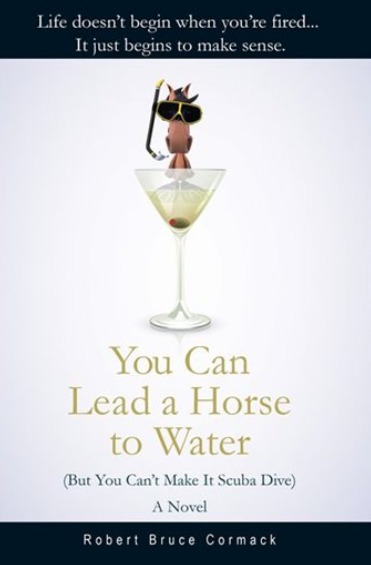Surefire Ways To Be Happy This Year.
First, think like a dog. Second, hug like a dog.

“Nobody says, Just go be happy — go be a cobbler or go live with goats,” Sandra Bullock
I’ve just seen my fourth animal-hugging video on Facebook. It’s cute as hell, but depressing. My dog never hugged me in fifteen years. You’d think keeping him alive that long deserved a hug, but he credited his longevity to wagging his tail. It got him a lot of food, but also got him killed. It seems cars aren’t nearly as impressed by wagging tails as the rest of us.
Let’s not underestimate a dog’s hug, though — or any animal’s, for that matter. Scientists say we get the same endorphin rush as we do from sex. In fact, if we hugged animals instead of getting all grabby with people who don’t want to be grabbed, we’d be a lot better off.
Here’s the thing about dogs (and most animals): The reason they get away with things isn’t because they’re cute. It’s because nobody believes they have ulterior motives. We think all animals offer unconditional love, which isn’t true at all. Try not feeding your cat for a few days. It’ll scratch your eyes out.
We think all animals offer unconditional love, which isn’t true at all. Try not feeding your cat for a few days.
Still, this is what stands in the way of our happiness. We’re human, and therefore we can’t give unconditional love because, well, we’re not dogs. Dogs set a very high standard where love is concerned. We’ve set a very low one.
Unconditional love can’t have ulterior motives. Dogs understand this because they don’t even know what an ulterior motive is. Cats know what it is, and would rather sleep. So, to be happy, we have to think like dogs, and forget ulterior motives and conditional love. Either that or sleep like cats.
This won’t be easy because, as Mark Twain once said, “Humans are capable of advanced thinking, and that’s a problem.” We cant’ stop ourselves. Any line of reasoning will eventually lead to alternative reasoning. “Fred likes me, and I like Fred, but if I seem too interested, he won’t like me, so I guess I’ll date Arnold, even though he makes me puke.”
Very few people beat dogs, and even fewer beat cats, so our thinking gets pretty convoluted.
We don’t set out to be idiots, it’s just our chemical makeup, what psychologists call our “fight or flight” mechanism. We look for the safest avenue because we don’t want to be beaten like a dog. Very few people beat dogs, and even fewer beat cats, so our thinking gets pretty convoluted.
Various neurological studies have shown that the average person has more than thirty thousand thoughts a day. Ninety percent are repetitive, eighty percent are negative, and the rest are dirty.
In other words, our thinking is pretty limited. It could be right up there with a dog’s, except dogs wag their tails and act adorable. They get treats and scratched behind the ears. We act like neurotic ninnies.
Dogs also have a forgiving nature, something we, as humans, struggle with every day. We can say, “I’ll forgive him or her,” but then we’re thinking, “Why didn’t they forgive us first?” So we go back to analyzing again, then decide we’ll forgive them if they never do it again. This is called conditional love.
Dogs figure it another way. Say you scolded your dog for tipping over your cup of coffee. You boot him outside. First of all, outside isn’t so bad. There are new scents, new animals, even an old tennis ball. He plays with the ball, chases a few cats, then comes back inside all happy.
Ironically, for all the worrying we do, very little is constructive. Mostly it’s ulterior motives, revenge, giving people wedgies.
You say to your spouse, “Isn’t Rudy amazing? As angry as we get, he always comes back inside all loving and forgiving.” Well, sure he does. He doesn’t even remember what he did wrong. You pet him, feed him, life is good.
We, on the other hand, worry. All creatures worry to some extent. We do it more often because of our advanced thinking. Ironically, for all the worrying we do, very little is constructive. Mostly it’s ulterior motives, revenge and giving people wedgies.
This often proves to be useless, since most problems go away on their own. If they don’t, you snooze. Cats forget everything after a snooze. So do seniors and most basketball players.
Remember the “fight or flight” mechanism? Dogs and cats have that, too. It’s very fine tuned and explains why their thoughts are so simple. They can’t be distracted or they’ll end up as dog meat — or cat paté.
Since my dog lived to be fifteen (a hundred and five in dog years), it stands to reason he knew how to stay focused. It also explains why dogs act so loving all the time. Unconditional love is good for you. Without thoughts of revenge or wedgies, ulterior motives can’t exist. That’s why black dogs aren’t villains. They’re actually considered cuties who love licking your hand.
We need to turn off our ulterior motives and find joy in simple things like tennis balls and, well, hugs.
Given how healthy unconditional love is, we should all think like dogs. We need to turn off our ulterior motives and find joy in simple things like old tennis balls and, well, hugs.
Hugging is like unconditional love, only you can hug just about anyone, unless they don’t want to be hugged. Then it’s considered grabby. People get arrested for being grabby. Even dogs can be arrested. Most don’t because they’re so forgiving and happy, and who wants to arrest a forgiving happy dog?
I’d suggest hugging your family and friends first. They may be surprised if they’re not used to being hugged, but they’ll settle down. They’ll see a new happier you, someone ready to forgive and forget. You can say it’s because of the dog, and you’re trying to be a lot more like him, and you wouldn’t mind going out and playing in the yard.
Then you’ve got what psychologists call “territorial prerogative” or simply “tennis ball prerogative.”
They’ll think you’re weird chewing on old tennis balls, but to each his own, right? Besides, the dog won’t mind. He’ll even play with you. Unless he considers it his tennis ball. Then you’ve got what psychologists call “territorial prerogative” or simply “tennis ball prerogative.”
In which case, drop the ball, run like hell. Dogs can get nasty.
Robert Cormack is a novelist, journalist and blogger. His first novel “You Can Lead a Horse to Water (But You Can’t Make It Scuba Dive)” is available online and at most major bookstores (now in paperback). Check out Yucca Publishingor Skyhorse Pressfor more details.

Articles from Robert Cormack
View blog
When you start dispersing crowds with James Blunt songs, it makes you wonder if the world is funny o ...

Or is it us? (It's us). · “I intend to live forever, or die trying.” Groucho Marx · I didn’t want to ...

In honour of Women's Day, let's see which is more offensive. · “Life is tough, darling, and we’d bet ...
You may be interested in these jobs
-
cook
3 days ago
Hero Certified Burgers Toronto, CanadaEducation: Secondary (high) school graduation certificate · Experience: 1 year to less than 2 years · Work setting · Restaurant · Tasks · Prepare and cook complete meals or individual dishes and foods · Prepare dishes for customers with food allergies or intolerances · Prepare an ...
-

Nouveaux diplômés
3 weeks ago
Rio Tinto Montreal, Canada Full timeMontréal · Cybersécurité · Nouveau diplômé 2024 · Si vous voulez piloter un vrai changement, nous avons l'endroit pour le faire. Nos programmes de talents émergents vous permettent de façonner Rio Tinto. Nous voulons que vous fassiez partie de notre équipe pour nous aider à avanc ...
-

Full Time Warehouse Associate
5 hours ago
Direct apply
Cardinal Couriers Ltd. Hamilton, Canada Full time**About**: · Cardinal Couriers is looking for motivated individuals to join our team. This position is responsible of Picking, Packing, shipping, receiving, Loading, and unloading orders into the trucks. This is a physically demanding, fast-paced environment that requires lifting ...

Comments